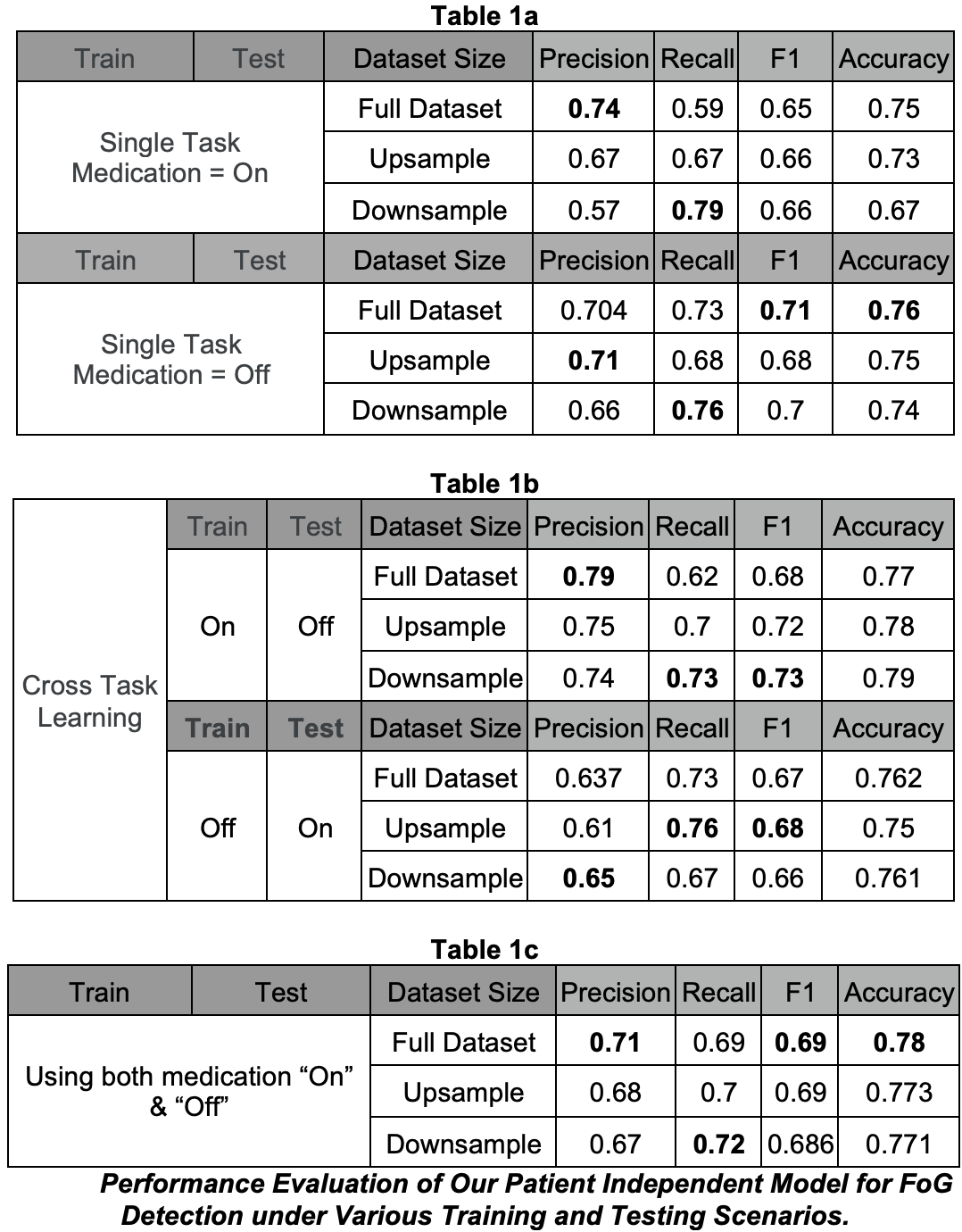Category: Parkinson’s Disease: Clinical Trials
Objective: This study developed a novel patient-independent, cost-effective AI model for detecting Freezing of Gait (FoG), using a single wearable sensor and without the need for model retraining in new patients. This approach is expected to reduce patient burden and enhance clinical adoption of the technology. Using a single accelerometer and a rigorous validation methodology, we address individual variability in gait and demonstrate model’s generalizability through cross-validation methods [table 1–2].
Background: FoG is a disabling symptom of advanced Parkinson’s disease (PD). It leads to falls, reduces quality of life and contributes to an inability to live independently [1-2]. Prior research on FoG detection used multiple sensors and required collecting and annotating sensor data as well as model retraining for each patient [3-5]. These factors place a substantial burden on patients and caregivers and limit technology utilization in real-world settings.
Method: We used gait data from 40 people with PD with an accelerometer during ‘On’ and ‘Off’ medication states [6]. Timing and duration of actual freezing events were identified offline and used to train the FoG detection algorithm. We trained a three-layer Convolutional Neural Network (CNN) with skip connections, extracting time-domain features over 3-second signal segments. To mitigate class imbalance, we explored both up-sampling (SMOTE [7]) and down-sampling methods. The evaluation used leave-one-subject-out analysis across single-task, cross-task and combined medication scenarios [table 1].
Results: Our patient-independent model achieved an overall accuracy of 78% in detecting FoG events using both medication ‘On’ and ‘Off’ state data. Sampling methods did not improve classification accuracy and F1 score, but down-sampling improved recall by 3% [table 1c]. Cross-task learning achieved up to 79% accuracy demonstrating model adaptability for patients with varying motor function conditions [table 1b]. However, models trained on ‘On’ medication data had lower performance when testing ‘Off’ medication, highlighting the impact of symptom severity on detection accuracy [table 1a].
Conclusion: Our findings indicate that AI can be used to predict FoG events across different medication states using a single sensor. This could potentially lead to the development of cost-effective, patient-friendly mobile health interventions.
Table 1
Table 2
References: 1. Lewis S, Factor S, Giladi N, Nieuwboer A, Nutt J, Hallett M. Stepping up to meet the challenge of freezing of gait in Parkinson’s disease. Transl Neurodegener. 2022 May 1;11(1):23. doi: 10.1186/s40035-022-00298-x. PMID: 35490252; PMCID: PMC9057060.
2. Nieuwboer A, Giladi N. Characterizing freezing of gait in Parkinson’s disease: models of an episodic phenomenon. Mov Disord. 2013 Sep 15;28(11):1509-19. doi: 10.1002/mds.25683. PMID: 24132839.
3. V. Mikos et al., “Real-Time Patient Adaptivity for Freezing of Gait Classification Through Semi-Supervised Neural Networks,” 2017 16th IEEE International Conference on Machine Learning and Applications (ICMLA), Cancun, Mexico, 2017, pp. 871-876, doi: 10.1109/ICMLA.2017.00-46.
4. Naghavi N, Wade E. Towards Real-Time Prediction of Freezing of Gait in Patients With Parkinson’s Disease: A Novel Deep One-Class Classifier. IEEE J Biomed Health Inform. 2022 Apr;26(4):1726-1736. doi: 10.1109/JBHI.2021.3103071. Epub 2022 Apr 14. PMID: 34375292.
5. Borzì L, Mazzetta I, Zampogna A, Suppa A, Olmo G, Irrera F. Prediction of Freezing of Gait in Parkinson’s Disease Using Wearables and Machine Learning. Sensors (Basel). 2021 Jan 17;21(2):614. doi: 10.3390/s21020614. PMID: 33477323; PMCID: PMC7830634.
6. Addison Howard, amit salomon, eran gazit, HCL-Jevster, Jeff Hausdorff, Leslie Kirsch, Maggie, Pieter Ginis, Ryan Holbrook, Yasir F Karim. (2023). Parkinson’s Freezing of Gait Prediction. Kaggle. https://kaggle.com/competitions/tlvmc-parkinsons-freezing-gait-prediction
7. N. V. Chawla, K. W. Bowyer, L. O. Hall, and W. P. Kegelmeyer, “Smote: synthetic minority over-sampling technique,” Journal of artificial intelligence research, vol. 16, pp. 321–357, 2002
To cite this abstract in AMA style:
SB. Soumma, D. Peterson, H. Ghasemzadeh, S. Mehta. AI-Powered Detection of Freezing of Gait Using Wearable Sensor Data in Patients with Parkinson’s Disease [abstract]. Mov Disord. 2024; 39 (suppl 1). https://www.mdsabstracts.org/abstract/ai-powered-detection-of-freezing-of-gait-using-wearable-sensor-data-in-patients-with-parkinsons-disease/. Accessed December 16, 2025.« Back to 2024 International Congress
MDS Abstracts - https://www.mdsabstracts.org/abstract/ai-powered-detection-of-freezing-of-gait-using-wearable-sensor-data-in-patients-with-parkinsons-disease/


